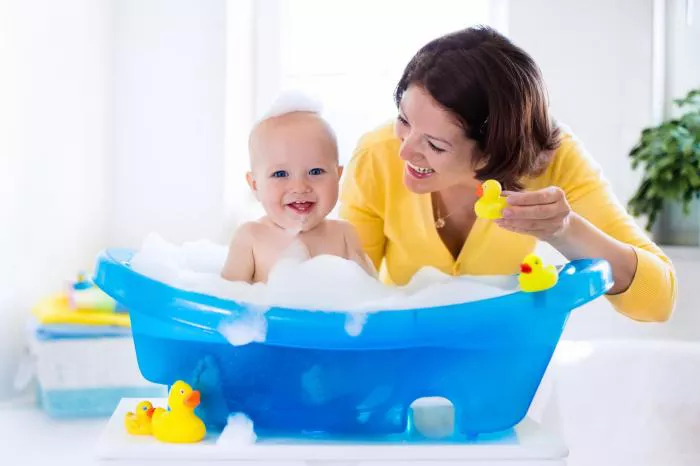Bathing a newborn is a tender experience. It allows parents to bond with their baby while also ensuring cleanliness. However, when it comes to using soap on a newborn, many parents have questions. Newborns have sensitive skin, and their care requires special attention. This article explores when and how to start using soap on your newborn, along with essential tips for bathing.
Understanding Newborn Skin
Newborns have delicate and sensitive skin. This skin is thinner than adult skin. It also has fewer protective oils. The outer layer of a newborn’s skin is not fully developed. This makes it more prone to irritation and dryness. The natural protective barrier that helps keep moisture in and irritants out is still forming.
Because of these factors, many parents worry about using soap. They want to make sure they do not harm their baby’s skin. It is essential to understand that newborn skin has specific needs.
The First Few Weeks
In the first few weeks of life, your baby does not need regular bathing with soap. The primary focus should be on keeping your baby clean without irritating their skin. Newborns typically do not get very dirty. Most of the time, they are in a controlled environment.
During the first week, your baby might still have the vernix caseosa on their skin. This is a white, waxy substance that protected the skin in the womb. It is safe to leave this on, and it will absorb naturally. If you wipe your baby after birth, it is usually enough to use just warm water.
Sponge Baths
For the first few weeks, sponge baths are recommended. This method allows you to clean your baby without fully immersing them in water. Use a soft washcloth dampened with warm water. Clean the areas that tend to get dirty, such as the face, neck, and diaper area.
There is no need to use soap during sponge baths in the first few weeks. If you feel it is necessary to use soap, choose a mild, fragrance-free soap.
Transitioning to Bathing
As your newborn grows, usually after the first month, you can start introducing regular baths. At this stage, the skin will be a bit more resilient. However, it is still crucial to be cautious about the products you use.
Choosing the Right Soap
When you decide to use soap, opt for products designed for infants. Look for soaps that are labeled as hypoallergenic. These products are less likely to cause allergic reactions or skin irritation.
Avoid soaps that contain fragrances, dyes, or harsh chemicals. These additives can irritate your baby’s sensitive skin. Gentle, moisturizing soaps are best for keeping the skin clean without stripping it of its natural oils.
Frequency of Baths
How often should you bathe your newborn? In the early weeks, two to three baths per week is enough. Daily bathing is not necessary and can even dry out the skin. As your baby grows and becomes more active, you might need to bathe them more frequently.
However, remember that a sponge bath can be enough between regular baths.
Bathing Techniques
When it’s time for a bath, make sure you have everything you need within reach. This includes soap, towels, and a washcloth. You want to make the process smooth and safe.
Preparing the Bath
Fill the baby tub or sink with a few inches of warm water. The water temperature should be comfortable to the touch, about 37 to 38 degrees Celsius (98.6 to 100.4 degrees Fahrenheit).
Make sure the room is warm to keep your baby comfortable. Undress your baby and gently lower them into the water. Always support their head and neck during the bath.
Using Soap
Start by wetting your baby’s body with water. Use a small amount of soap to wash the baby’s face and body. For the face, it is usually best to use just water or a tiny amount of soap. Rinse thoroughly to ensure no soap residue is left behind.
When washing the diaper area, take special care. This area is prone to irritation and diaper rash. Use a gentle soap and rinse well.
After the Bath
Once the bath is complete, lift your baby out carefully. Wrap them in a soft, warm towel. Pat your baby dry, paying special attention to the creases in their skin.
After drying, apply a gentle moisturizer if needed. This helps keep the skin hydrated. Again, choose a product designed for babies and avoid anything with strong scents or irritants.
Skin Issues to Watch For
As you start using soap, be vigilant for signs of skin irritation. Look for redness, rashes, or excessive dryness. If you notice any of these symptoms, it may indicate that the soap you are using is too harsh.
In such cases, discontinue the use of that product and consult your pediatrician for recommendations.
Allergies and Sensitivities
Every baby is unique, and some may develop allergies or sensitivities to certain ingredients. Always introduce new products slowly. Use one product at a time to monitor how your baby’s skin reacts.
If your baby shows signs of an allergic reaction, such as hives or swelling, stop using the product immediately and seek medical advice.
Conclusion
Knowing when to start using soap on a newborn is essential for their skin health. In the first few weeks, stick to sponge baths with just warm water. As your baby grows, you can begin regular baths with gentle, mild soap.
Always choose products designed for infants to protect their sensitive skin. Bathing should be a pleasant experience for both you and your baby. By following these guidelines, you can ensure a safe and enjoyable bathing routine that keeps your newborn clean and comfortable.
With careful attention to your baby’s skin and a gentle approach, you can navigate the world of newborn bathing with confidence. Enjoy this special time with your little one, and cherish the moments spent during bath time.
Related topics:


